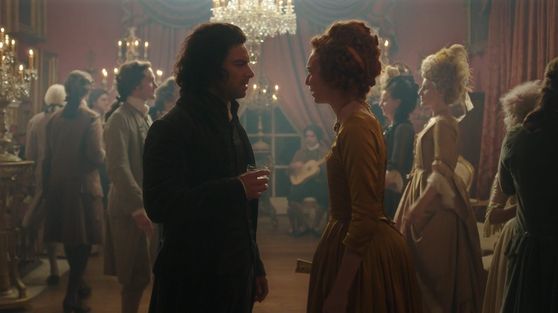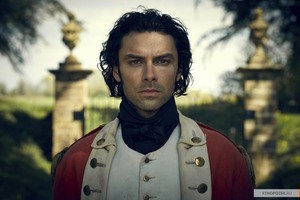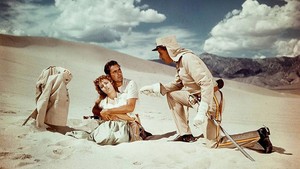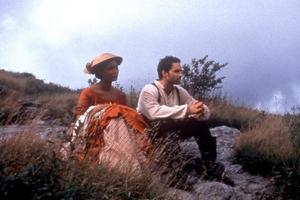"POLDARK" SERIES ONE (2015): EPISODES FIVE TO EIGHT
Within the past year, I had developed a major interest in Autor Winston Graham's 1945-2002 "POLDARK" literary saga and the two Fernsehen adaptations of it. Series One of the Sekunde adaptation produced Von Debbie Horsfield, premiered on the BBC (in Great Britain) and PBS (in the United States) last year. Consisting of eight episodes, Series One of "POLDARK" was an adaptation of 1945's "Ross Poldark - A Novel of Cornwall, 1783-1787" and "Demelza - A Novel of Cornwall, 1788-1790".
Whereas Episodes One to Four adapted the 1945 novel, Episodes Five to Eight adapted the 1946 novel.
Episode Four left off with the death of Ross Poldark's uncle, Charles; leaving Trenwith, the family's premiere estate, in the hands of his cousin Francis. Ross' former küche maid and new bride, Demelza Carne Poldark, formed a friendship with Francis' sister Verity and accompanied Ross to a rather tense Weihnachten celebration at Trenwith, which was further marred Von an unexpected appearance of the noveau-riche Warleggan family and friends. Ross also learned that copper had been discovered inside his mine and that Demelza had become pregnant with their first child.
Episode Five began several months later with the arrival of a traveling theater company that includes a young actress named Keren, who attracts the attention of miner Mark Daniels. The episode also marked the arrival of two other players - Dwight Enys, a former British Army officer and doctor, who happens to be a former comrade of Ross'; and young Julia Poldark, whose birth interrupted her parents' enjoyment of the traveling theater company's performance. The four episodes featured a good number of events and changes in Ross Poldark's life. Julia's birth led to a riotous christening in which he and Demelza had to deal with unexpected guests. Francis Lost his fortune and his mine to George Warleggan's cousin Matthew Sanson at a gaming party. Ross learned that his former employee Jim Carter was seriously ill at the Bodomin Jail and tried to rescue the latter with Dwight Enys' help. The tragic consequences of their attempt led to Ross' ill nature at the Warleggan's ball. Dwight drifted into an affair with Keren Daniels, with tragic results.
Ross and several other mine owners created the Carnmore Copper Company in an effort to break the Warleggans' stranglehold on the mineral smelting business, while Demelza plotted to resurrect her cousin-in-law Verity Poldark's romance with Captain Andrew Blamey. The success of her efforts led to an estrangement between Ross and Frances. Demelza's matchmaking also led to financial disaster for her husband's new business venture. A Putrid's Throat epidemic struck the neighborhood, affecting Francis, Elizabeth and their son Geoffrey Charles. Not long after Demelza had nursed them back to health, both she and Julia were stricken Von disease. The season ended with a series of tragic and tumultuous events. Although Demelza recovered, Julia succumbed to Putrid's Throat. The Warleggans' merchant ship wrecked off the coast of Poldark land and Ross alerted locals like Jud and Prudie Paynter to salvage any goods that wash up on the shore. This "salvaging" led to violence between those on Poldark lands and neighboring miners and later, both against local military troops. One of the victims of the shipwreck turned out to be the Warleggans' cousin, Matthew Sanson. After Ross insulted Sanson's death in George Warleggan's face, the season ended with the latter arranging for Ross' arrest for inciting the riot.
I must admit that I liked these Weiter four episodes a bit Mehr than I did the first quartet. Do not get me wrong. I enjoyed those first episodes very much. But Episodes Five to Eight not only deepened the saga - naturally, considering a they were continuation of the first four - but also expanded the world of Ross Poldark.
One of the aspects of Series One's Sekunde half that caught both my attention and my admiration was the production's continuing portrayal of Britain's declining economic situation during the late 18th century . . . especially for the working class. Both Episodes Five and Seven featured brief scenes that conveyed this situation. In Episode Five; Ross, Demelza and Verity encounter a starving family on the road to Turo, begging for Essen oder money. A Sekunde brief scene in Episode Seven featured Demelza baking brot and later, dispersing it to the neighborhood's starving poor. However, the series also featured bigger scenes that really drove Home the dire economic situation. Upon reaching Truro in Episode Five, both Demelza and Verity witnessed a riot that broke out between working-class locals and the militia when the former tried to access the grain stored inside Matthew Sanson's warehouse. I found the sequence well shot Von director William McGregor. The latter also did an excellent job in the sequence that featured locals like the Paynters ransacking much needed Essen and other goods that washed ashore from the Warleggans' wrecked ship. I was especially impressed Von how the entire sequence segued from Ross wallowing in a state of grief over his daughter's death before spotting the shipwreck to the militia's violent attempt to put down the riot that had developed between the tenants and miners on Ross' land and locals from other community.
Even the upper-classes have felt the pinch of economic decline, due to the closing and loses of mines across the region and being in debt to bankers like the Warleggans. Following the discovery of copper inside his family's mine in Episode Four, Ross seemed destined to avoid such destitution. Not only was he able to afford a new kleid and jewels for Demelza to wear at the Warleggan ball in Episode Six, he used his profits from the mine to create a smelting company - the Carnmore Copper Company - with the assistance of other shareholders in an effort to break the Warleggans' monopoly on the local mining industry. One cannot say the same for his cousin Francis, who continued to rock on the edge of debt, following his father's death. Unfortunately, Francis wasted a good deal of his money on gambling and presents for the local prostitute named Margaret. In a scene that was not in the novel, but I found both enjoyable and very effective, he Lost both his remaining fortune and his mine, Wheal Grambler, to the Warleggans' cousin, Matthew Sanson, at a gaming party. But this was not the end of the sequence. Thanks to director William McGregor and Horsfield's script. The sequence became even Mehr fascinating once the Poldarks at Trenwith learned of Francis' loss, especially Elizabeth. And it ended on a dramatic level with Francis being forced to officially close Wheal Grambler in front a crowd. I realize the sequence was not featured in Graham's novel, but if I must be honest; I thought Horsfield's changes really added a good deal of drama to this turn of events. Not only did McGregor shot this sequence rather well, I really have to give kudos to Kyle Soller, who did an excellent job in portraying Francis at his nadir in this situation; and Heida Reed, who did such a superb job conveying the end of Elizabeth's patience with her wayward husband with a slight change in voice tone, body language and expression.
I was also impressed Von other scenes in Series One's Sekunde half. The christening for Ross and Demelza's new daughter, Julia, provided some rather hilarious moments as their upper-crust neighbors met Demelza's religious fanatic of a father and stepmother. Thanks to Harriet Ballard and Mark Frost's performances, I especially enjoyed the confrontation between the snobbish Ruth Treneglos and the blunt Mark Carne. It was a blast. Ross and Dwight's ill-fated rescue of a seriously ill Jim Carter from the Bodmin Jail was filled with both tension and tragedy. Tension also marked the tone in one scene which one of the Warleggans' minions become aware of the newly formed Carnmore Copper Company during a bidding session. Another scene that caught my interest featured George Warleggan's successful attempt at manipulating a very angry Francis into revealing the names of shareholders in Ross' new cooperative . . . especially after the latter learned about his sister Verity's elopement with Andrew Blamey. Both Soller and Jack Farthing gave excellent and subtle performances in this scene. Once again, McGregor displayed a talent for directing large scenes in his handling of the sequence that featured the wreck of the Warleggans' ship, the Queen Charlotte, and both the looting and riot on the strand that followed. Series One ended on a dismal note with Ross and Demelza dealing with the aftermath of young Julia's death and Ross' arrest Von the militia for leading the strand riot. Although I found the latter scene a bit of a throwaway, I was impressed Von the scene featuring a grieving Ross and Demelza, thanks to the excellent performances from series leads, Aidan Turner and Elinor Tomlinson.
If there is one sequence that I really enjoyed in Series One of "POLDARK", it was the Warleggan ball featured in Episode Six. Ironically, not many people enjoyed it. They seemed put out Von Ross' boorish behavior. I enjoyed it. Ross seemed in danger of becoming a Gary Stu Von this point. I thought it was time that audiences saw how unpleasant he can be. And Turner did such an excellent job in conveying that aspect of Ross' personality. He also got the chance to verbally kreuz swords with Robin Ellis' Reverend Dr. Halse for the Sekunde time. Frankly, it was one of the most enjoyable moments in the series, so far. Both Turner and Ellis really should consider doing another project together. The segment ended with not only an argument between Ross and Demelza that I found enjoyable, but also a rather tense card game between "our hero" and the Warleggans' cousin Matthew Sanson that seemed enriched Von performances from both Turner and Jason Thorpe.
I wish I had nothing further to say about Episodes to Eight of Series One. I really do. But . . . well, the episodes featured a good number of things to complain about. One, there were two sequences in which Horsfield and McGregor tried to utilize two scenes Von Wird angezeigt them simultaneously. Episode Seven featured a segment in which both Demelza and Elizabeth tried to prevent a quarrel between two men in separate scenes - at the same time. And Episode Eight featured a segment in which both Ross and Demelza tried to explain the circumstances of their financial downfall (the destruction of the Carnmore Copper Company and Verity Poldark's elopement) to each other via flashbacks . . . and at the same time. Either Horsfield was trying to be artistic oder economic with the running time she had available. I do not know. However, I do feel that both sequences were clumsily handled and I hope that no such narrative device will be utilized in Series Two.
I have another minor quibble and it has to do with makeup for both Eleanor Tomlinson and Heida Reed. In Episode Eight, the characters for both Schauspielerinnen - Demelza Poldark and Elizabeth Poldark - had been stricken Von Putrid's Throat. Both characters came within an inch of death. Yet . . . for the likes of me, I found the production's different handling of the makeup for both women upon their recovery from Putrid's Throat rather odd. Whereas Elizabeth looked as if she had recently recovered from a serious illness oder death (extreme paleness and dark circles under the eyes), the slight reddish tints on Demelza's face made her looked as if she had recently recovered from a cold. Winston Graham's portrayal of Demelza has always struck me as a bit too idealized. In fact, she tends to come off as a borderline Mary Sue. And both the 1970s series and this Kürzlich production are just as guilty in their handling of Demelza's character. But this determination to make Demelza look beautiful - even while recovering from a near fatal illness - strikes me as completely ridiculous.
If there is one aspect of this Sekunde group of Series One's episodes that really troubled me, it was the portrayal of traveling actress Keren Smith Daniels and her affair with Dr. Dwight Enys. After viewing Debbie Horsfield's portrayal of the Keren Daniels character, I found myself wondering it Debbie Horsfield harbored some kind of whore/Madonna mentality. Why on earth did she portray Keren in such an unflattering and one-dimensional manner? Instead of delving into Keren's unsatisfaction as Mark Daniels' wife and treating her as a complex woman, Horsfield ended up portraying her as some one-dimensional hussy/adultress who saw Dwight as a stepping stone up the social ladder. Only in the final Sekunden of Keren's death was actress Sabrina Barlett able to convey the character's frustration with her life as a miner's wife. Worse, Horsfield changed the nature of Keren's death, Von having Mark accidentally squeeze her to death during an altercation, instead of deliberately murdering her. Many had accused Horsfield of portraing Keren in this manner in order to justify Mark's killing of her, along with Ross and Demelza's decision to help him evade the law. Frankly, I agree. I find it distasteful that the portrayal of a character - especially a female character - was compromised to enrich the heroic image of the two leads - especially the leading man. Will this be the only instance of a supporting character being compromised for the sake of the leading character? oder was Horsfield's portrayal of Keren Daniels the first of such other unnecessary changes to come?
Despite my disppointment with the portrayal of the Keren Daniels character and her affair with Dwigh Enys and a few other aspects of the production, I had no problems with Episode Five to Eight of Series One for "POLDARK". If I must be honest, I enjoyed it slightly Mehr than I did the first four episodes. With the adaptation of "Demelza - A Novel of Cornwall, 1788-1790" complete, I am curious to see how Debbie Horsfield and her production staff handle the adaptation of Winston Graham's Weiter two novels in his literary series.
Within the past year, I had developed a major interest in Autor Winston Graham's 1945-2002 "POLDARK" literary saga and the two Fernsehen adaptations of it. Series One of the Sekunde adaptation produced Von Debbie Horsfield, premiered on the BBC (in Great Britain) and PBS (in the United States) last year. Consisting of eight episodes, Series One of "POLDARK" was an adaptation of 1945's "Ross Poldark - A Novel of Cornwall, 1783-1787" and "Demelza - A Novel of Cornwall, 1788-1790".
Whereas Episodes One to Four adapted the 1945 novel, Episodes Five to Eight adapted the 1946 novel.
Episode Four left off with the death of Ross Poldark's uncle, Charles; leaving Trenwith, the family's premiere estate, in the hands of his cousin Francis. Ross' former küche maid and new bride, Demelza Carne Poldark, formed a friendship with Francis' sister Verity and accompanied Ross to a rather tense Weihnachten celebration at Trenwith, which was further marred Von an unexpected appearance of the noveau-riche Warleggan family and friends. Ross also learned that copper had been discovered inside his mine and that Demelza had become pregnant with their first child.
Episode Five began several months later with the arrival of a traveling theater company that includes a young actress named Keren, who attracts the attention of miner Mark Daniels. The episode also marked the arrival of two other players - Dwight Enys, a former British Army officer and doctor, who happens to be a former comrade of Ross'; and young Julia Poldark, whose birth interrupted her parents' enjoyment of the traveling theater company's performance. The four episodes featured a good number of events and changes in Ross Poldark's life. Julia's birth led to a riotous christening in which he and Demelza had to deal with unexpected guests. Francis Lost his fortune and his mine to George Warleggan's cousin Matthew Sanson at a gaming party. Ross learned that his former employee Jim Carter was seriously ill at the Bodomin Jail and tried to rescue the latter with Dwight Enys' help. The tragic consequences of their attempt led to Ross' ill nature at the Warleggan's ball. Dwight drifted into an affair with Keren Daniels, with tragic results.
Ross and several other mine owners created the Carnmore Copper Company in an effort to break the Warleggans' stranglehold on the mineral smelting business, while Demelza plotted to resurrect her cousin-in-law Verity Poldark's romance with Captain Andrew Blamey. The success of her efforts led to an estrangement between Ross and Frances. Demelza's matchmaking also led to financial disaster for her husband's new business venture. A Putrid's Throat epidemic struck the neighborhood, affecting Francis, Elizabeth and their son Geoffrey Charles. Not long after Demelza had nursed them back to health, both she and Julia were stricken Von disease. The season ended with a series of tragic and tumultuous events. Although Demelza recovered, Julia succumbed to Putrid's Throat. The Warleggans' merchant ship wrecked off the coast of Poldark land and Ross alerted locals like Jud and Prudie Paynter to salvage any goods that wash up on the shore. This "salvaging" led to violence between those on Poldark lands and neighboring miners and later, both against local military troops. One of the victims of the shipwreck turned out to be the Warleggans' cousin, Matthew Sanson. After Ross insulted Sanson's death in George Warleggan's face, the season ended with the latter arranging for Ross' arrest for inciting the riot.
I must admit that I liked these Weiter four episodes a bit Mehr than I did the first quartet. Do not get me wrong. I enjoyed those first episodes very much. But Episodes Five to Eight not only deepened the saga - naturally, considering a they were continuation of the first four - but also expanded the world of Ross Poldark.
One of the aspects of Series One's Sekunde half that caught both my attention and my admiration was the production's continuing portrayal of Britain's declining economic situation during the late 18th century . . . especially for the working class. Both Episodes Five and Seven featured brief scenes that conveyed this situation. In Episode Five; Ross, Demelza and Verity encounter a starving family on the road to Turo, begging for Essen oder money. A Sekunde brief scene in Episode Seven featured Demelza baking brot and later, dispersing it to the neighborhood's starving poor. However, the series also featured bigger scenes that really drove Home the dire economic situation. Upon reaching Truro in Episode Five, both Demelza and Verity witnessed a riot that broke out between working-class locals and the militia when the former tried to access the grain stored inside Matthew Sanson's warehouse. I found the sequence well shot Von director William McGregor. The latter also did an excellent job in the sequence that featured locals like the Paynters ransacking much needed Essen and other goods that washed ashore from the Warleggans' wrecked ship. I was especially impressed Von how the entire sequence segued from Ross wallowing in a state of grief over his daughter's death before spotting the shipwreck to the militia's violent attempt to put down the riot that had developed between the tenants and miners on Ross' land and locals from other community.
Even the upper-classes have felt the pinch of economic decline, due to the closing and loses of mines across the region and being in debt to bankers like the Warleggans. Following the discovery of copper inside his family's mine in Episode Four, Ross seemed destined to avoid such destitution. Not only was he able to afford a new kleid and jewels for Demelza to wear at the Warleggan ball in Episode Six, he used his profits from the mine to create a smelting company - the Carnmore Copper Company - with the assistance of other shareholders in an effort to break the Warleggans' monopoly on the local mining industry. One cannot say the same for his cousin Francis, who continued to rock on the edge of debt, following his father's death. Unfortunately, Francis wasted a good deal of his money on gambling and presents for the local prostitute named Margaret. In a scene that was not in the novel, but I found both enjoyable and very effective, he Lost both his remaining fortune and his mine, Wheal Grambler, to the Warleggans' cousin, Matthew Sanson, at a gaming party. But this was not the end of the sequence. Thanks to director William McGregor and Horsfield's script. The sequence became even Mehr fascinating once the Poldarks at Trenwith learned of Francis' loss, especially Elizabeth. And it ended on a dramatic level with Francis being forced to officially close Wheal Grambler in front a crowd. I realize the sequence was not featured in Graham's novel, but if I must be honest; I thought Horsfield's changes really added a good deal of drama to this turn of events. Not only did McGregor shot this sequence rather well, I really have to give kudos to Kyle Soller, who did an excellent job in portraying Francis at his nadir in this situation; and Heida Reed, who did such a superb job conveying the end of Elizabeth's patience with her wayward husband with a slight change in voice tone, body language and expression.
I was also impressed Von other scenes in Series One's Sekunde half. The christening for Ross and Demelza's new daughter, Julia, provided some rather hilarious moments as their upper-crust neighbors met Demelza's religious fanatic of a father and stepmother. Thanks to Harriet Ballard and Mark Frost's performances, I especially enjoyed the confrontation between the snobbish Ruth Treneglos and the blunt Mark Carne. It was a blast. Ross and Dwight's ill-fated rescue of a seriously ill Jim Carter from the Bodmin Jail was filled with both tension and tragedy. Tension also marked the tone in one scene which one of the Warleggans' minions become aware of the newly formed Carnmore Copper Company during a bidding session. Another scene that caught my interest featured George Warleggan's successful attempt at manipulating a very angry Francis into revealing the names of shareholders in Ross' new cooperative . . . especially after the latter learned about his sister Verity's elopement with Andrew Blamey. Both Soller and Jack Farthing gave excellent and subtle performances in this scene. Once again, McGregor displayed a talent for directing large scenes in his handling of the sequence that featured the wreck of the Warleggans' ship, the Queen Charlotte, and both the looting and riot on the strand that followed. Series One ended on a dismal note with Ross and Demelza dealing with the aftermath of young Julia's death and Ross' arrest Von the militia for leading the strand riot. Although I found the latter scene a bit of a throwaway, I was impressed Von the scene featuring a grieving Ross and Demelza, thanks to the excellent performances from series leads, Aidan Turner and Elinor Tomlinson.
If there is one sequence that I really enjoyed in Series One of "POLDARK", it was the Warleggan ball featured in Episode Six. Ironically, not many people enjoyed it. They seemed put out Von Ross' boorish behavior. I enjoyed it. Ross seemed in danger of becoming a Gary Stu Von this point. I thought it was time that audiences saw how unpleasant he can be. And Turner did such an excellent job in conveying that aspect of Ross' personality. He also got the chance to verbally kreuz swords with Robin Ellis' Reverend Dr. Halse for the Sekunde time. Frankly, it was one of the most enjoyable moments in the series, so far. Both Turner and Ellis really should consider doing another project together. The segment ended with not only an argument between Ross and Demelza that I found enjoyable, but also a rather tense card game between "our hero" and the Warleggans' cousin Matthew Sanson that seemed enriched Von performances from both Turner and Jason Thorpe.
I wish I had nothing further to say about Episodes to Eight of Series One. I really do. But . . . well, the episodes featured a good number of things to complain about. One, there were two sequences in which Horsfield and McGregor tried to utilize two scenes Von Wird angezeigt them simultaneously. Episode Seven featured a segment in which both Demelza and Elizabeth tried to prevent a quarrel between two men in separate scenes - at the same time. And Episode Eight featured a segment in which both Ross and Demelza tried to explain the circumstances of their financial downfall (the destruction of the Carnmore Copper Company and Verity Poldark's elopement) to each other via flashbacks . . . and at the same time. Either Horsfield was trying to be artistic oder economic with the running time she had available. I do not know. However, I do feel that both sequences were clumsily handled and I hope that no such narrative device will be utilized in Series Two.
I have another minor quibble and it has to do with makeup for both Eleanor Tomlinson and Heida Reed. In Episode Eight, the characters for both Schauspielerinnen - Demelza Poldark and Elizabeth Poldark - had been stricken Von Putrid's Throat. Both characters came within an inch of death. Yet . . . for the likes of me, I found the production's different handling of the makeup for both women upon their recovery from Putrid's Throat rather odd. Whereas Elizabeth looked as if she had recently recovered from a serious illness oder death (extreme paleness and dark circles under the eyes), the slight reddish tints on Demelza's face made her looked as if she had recently recovered from a cold. Winston Graham's portrayal of Demelza has always struck me as a bit too idealized. In fact, she tends to come off as a borderline Mary Sue. And both the 1970s series and this Kürzlich production are just as guilty in their handling of Demelza's character. But this determination to make Demelza look beautiful - even while recovering from a near fatal illness - strikes me as completely ridiculous.
If there is one aspect of this Sekunde group of Series One's episodes that really troubled me, it was the portrayal of traveling actress Keren Smith Daniels and her affair with Dr. Dwight Enys. After viewing Debbie Horsfield's portrayal of the Keren Daniels character, I found myself wondering it Debbie Horsfield harbored some kind of whore/Madonna mentality. Why on earth did she portray Keren in such an unflattering and one-dimensional manner? Instead of delving into Keren's unsatisfaction as Mark Daniels' wife and treating her as a complex woman, Horsfield ended up portraying her as some one-dimensional hussy/adultress who saw Dwight as a stepping stone up the social ladder. Only in the final Sekunden of Keren's death was actress Sabrina Barlett able to convey the character's frustration with her life as a miner's wife. Worse, Horsfield changed the nature of Keren's death, Von having Mark accidentally squeeze her to death during an altercation, instead of deliberately murdering her. Many had accused Horsfield of portraing Keren in this manner in order to justify Mark's killing of her, along with Ross and Demelza's decision to help him evade the law. Frankly, I agree. I find it distasteful that the portrayal of a character - especially a female character - was compromised to enrich the heroic image of the two leads - especially the leading man. Will this be the only instance of a supporting character being compromised for the sake of the leading character? oder was Horsfield's portrayal of Keren Daniels the first of such other unnecessary changes to come?
Despite my disppointment with the portrayal of the Keren Daniels character and her affair with Dwigh Enys and a few other aspects of the production, I had no problems with Episode Five to Eight of Series One for "POLDARK". If I must be honest, I enjoyed it slightly Mehr than I did the first four episodes. With the adaptation of "Demelza - A Novel of Cornwall, 1788-1790" complete, I am curious to see how Debbie Horsfield and her production staff handle the adaptation of Winston Graham's Weiter two novels in his literary series.
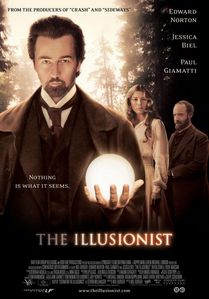
The poster!
As Du probably have already guessed, I am rewatching and recapping Poldark. This romantic saga follows Ross Poldark (Robin Ellis) as he loses his fiancée, the well-bred beauty, Elizabeth (Jill Townsend), to his cousin Francis (Clive Francis). Ross ends up marrying his servant, the unlikely-looking Demelza (Angharad Rees), but his passion for Elizabeth simmers on for years. Set in late 18th century Cornwall, the plot follows Ross Poldark’s attempts to make his derelict tin mines a success.
PART 1
Ross Poldark, limping and scarred, returns from the American war toCornwall after a daring escape from a French prison camp..... link
PART 1
Ross Poldark, limping and scarred, returns from the American war toCornwall after a daring escape from a French prison camp..... link



